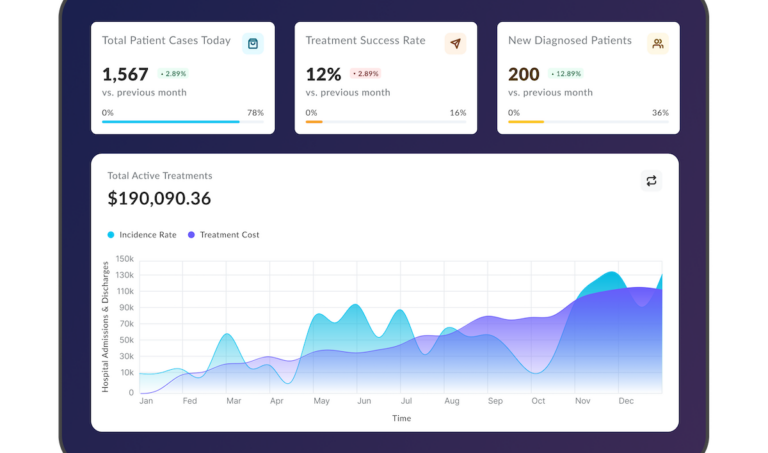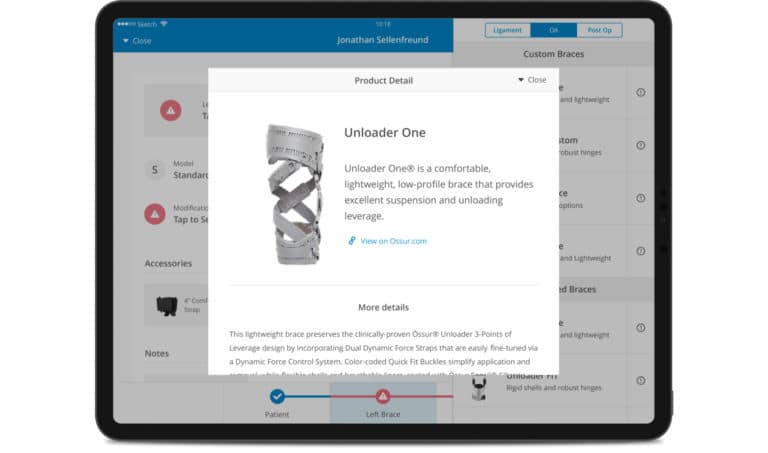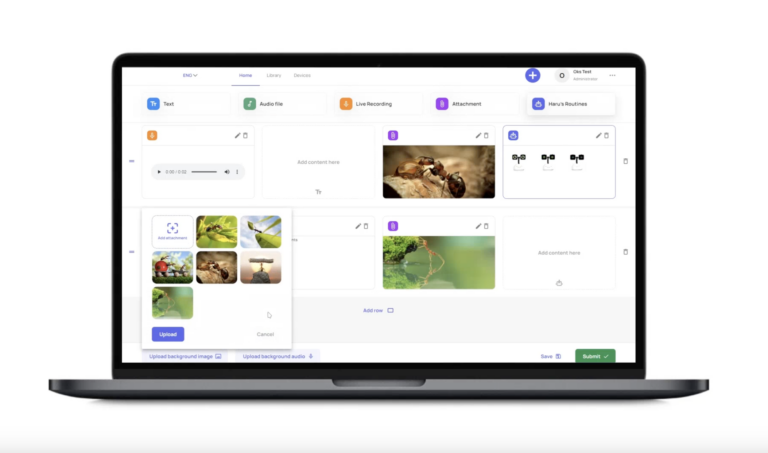Driving Innovation: Companies that Use Node.js to Succeed
Since Node.js’ humble beginning in 2009, it has become a heavy hitter in the corporate world, making serious waves in the ocean of technology. So isn’t it a wonder how so many leading companies are now harnessing its power to drive their success?
Node.js is not just a fleeting trend but rather an unstoppable force pushing the boundaries of digital innovation. And guess what? A growing number of businesses are catching on, harnessing the power of Node.js to build first-rate, cutting-edge products. It feels like Node.js is not just part of the race – it’s setting the pace.

We provide companies with senior tech talent and product development expertise to build world-class software. Let's talk about how we can help you.
Contact usTake a glance at the statistics. According to W3Tech, Node.js is fueling 2.0% of all websites. Now, you might be thinking, “2%? That sounds like a tiny fraction!” But wait a minute – when you consider the vastness of the World Wide Web, this figure translates into at least 30 million Node.js websites. Yes, you read it right.
So who uses Node.js? We’ve prepared a thrilling lineup of big companies using Node.js and capitalizing on its robust capabilities. But before we peel back the curtain and unveil these industry giants, let’s understand why Node.js is such a standout. We’ll dive into the key strengths that have rocketed it to tech stardom.
Table of Contents
Is it Really a Game-Changer?
Node.js has emerged as a powerhouse of innovation and efficacy. This open-source, cross-platform runtime environment, built in the universally admired language of JavaScript, is a potent tool for developing agile and scalable network applications. As far as web frameworks go, Node.js is reshaping the rules.
Node.js has leapfrogged past React.js to claim the title of the most widely used web framework among software developers globally as of 2022. That’s quite a standing ovation, isn’t it? And that’s just the start. For example, Node.js can reduce the loading time by an impressive 60%.
Most used web frameworks among developers worldwide, as of 2022

Why does this matter? Well, industry giants like Uber and Netflix, along with other companies that use Node.js, have been reaping the bounty of this robust framework since its inception, relishing the plethora of perks it brings to the table.
Top Benefits of Node.js
Whether you’re a business owner looking to streamline your digital assets, or a developer eager to harness the latest in web technology, the remarkable benefits of Node.js will leave you astounded. So, what’s the secret behind Node.js’s charm? Let’s dive in and unravel its magic.

- Lightning speed. Thanks to its event-driven, single-threaded design, Node.js delivers results in record time. Imagine juggling multiple requests in a snap without weighing down your RAM – that’s Node.js for you! In addition, it leverages the mighty V8 engine of Google Chrome, adeptly converting JavaScript into machine code. This non-blocking I/O framework, a cornerstone of the Node.js web app architecture, drives app performance to new heights.
- Maximum scalability. You can effortlessly scale applications both horizontally by adding nodes and vertically by boosting resources within a single node. Among all the websites that use Node.js, scalability is a unanimous thumbs-up.
- Cost-effectiveness. Thanks to Node.js, you can create server-side and frontend JavaScript codes in unison, eliminating the need for separate teams. It’s a resource-efficient, time-saving, and real game-changing blend.
- Customizability. Node.js’s extensibility allows you to shape it to meet unique requirements, and its APIs facilitate the construction of HTTP, TCP, and DNS servers. Add to that the flexibility of exchanging data in JSON format between the web server and client, and you’ve got yourself a bespoke solution.
- Unmatched community support. Node.js is not just a technology; it’s a fraternity of millions of developers worldwide, including tech giants like Amazon, Google, Facebook, and Netflix. These contributors enhance Node.js through open-source projects, ensuring its longevity and continued evolution.
- High performance. The single-threaded event loop in Node.js gracefully handles numerous concurrent users, enhancing your app’s responsiveness without straining resources. Proof of this is Netflix’s dramatic cut in startup time from 40 minutes to under 40 seconds.
- Fast loading time. Its Caching module allows developers to minimize task workload and avoid code re-execution. Consequently, the first module of a web application is cached in the in-app memory, allowing users to browse with minimal waiting time.
And even more advantages it can bring to your business.
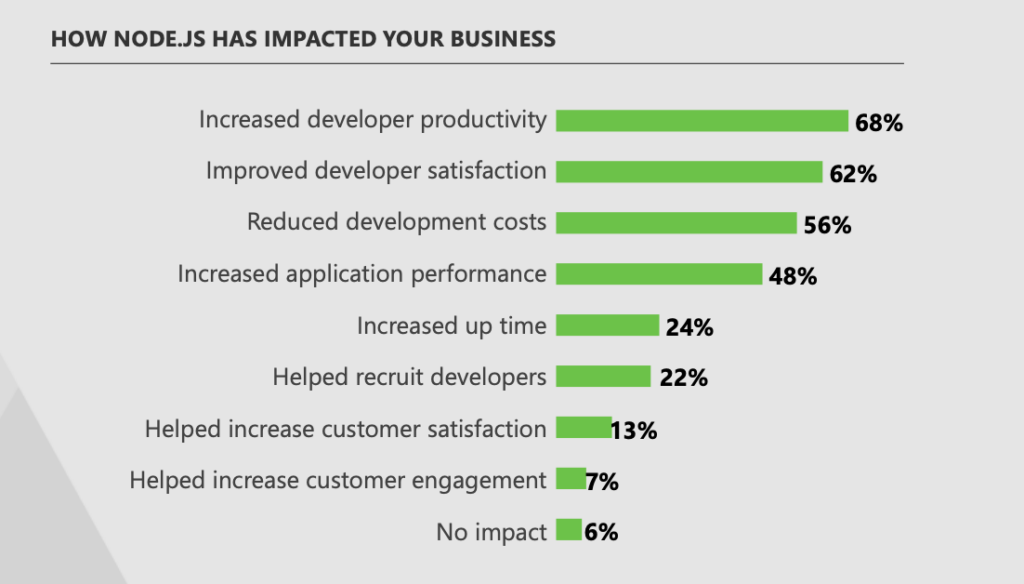
If you plan to bring dedicated Node.js developers on board or are ready to launch a new product, here are 8 compelling benefits Node.js could deliver for your startup.
Ready for the big reveal? Let’s unmask the major companies using Node.js in their production environment and unveil the rationale behind their choice.
Top 10 Global Companies Using Node.js for Backend
Here are some of the most popular applications and websites that use Node.js in the digital sphere, ones you’ve certainly interacted with. What’s their secret ingredient? They’ve all been expertly engineered using the dynamic power of Node.js.
1. PayPal
Imagine an arena where PayPal – one of the world’s largest and most respected platforms for transferring funds and accepting payments – holds court. With a user base exceeding 435 million active accounts as of 2022, it’s a colossal platform that facilitates seamless, secure virtual interactions, eliminating the need to disclose sensitive credit or debit card details.
Global user number of PayPal
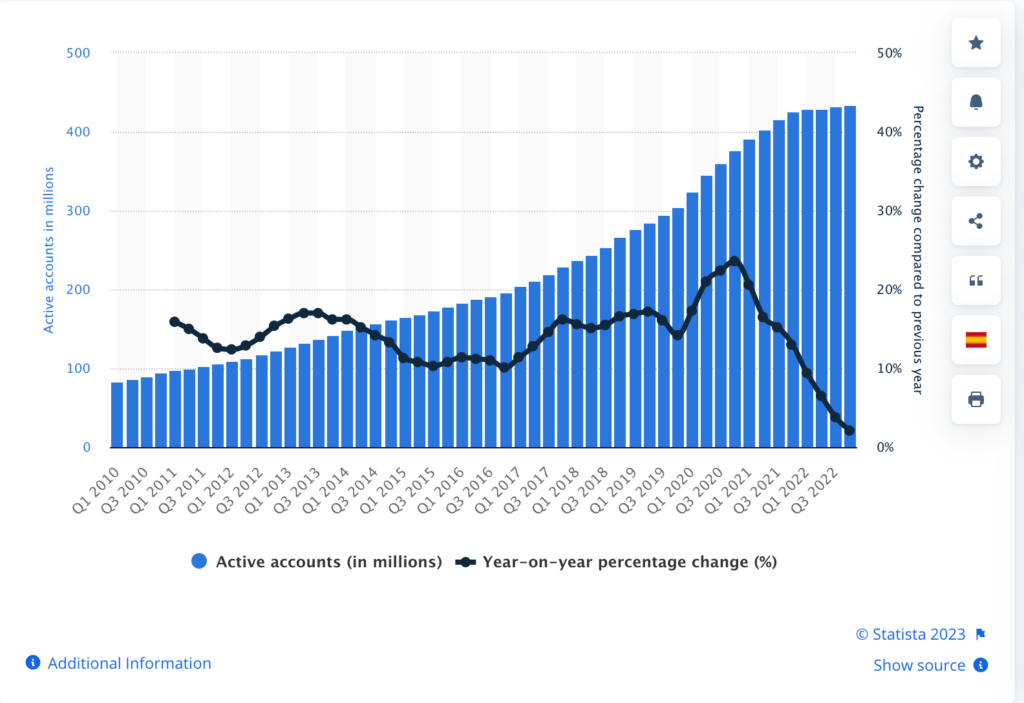
But did you know that PayPal wasn’t always in the Node.js camp? Initially, PayPal faced a considerable hurdle: a division in their teams. On one side, they had the browser maestros creating code with HTML, CSS, and JavaScript. On the other hand, server app virtuosos were building applications using Java. This dichotomy between browser and server was an obstacle that had to be overcome.
The breakthrough was realizing that JavaScript could bridge this gap, enabling them to write browser and server applications in a unified language. As a result, they combined their different engineering specialties into a cohesive, effective unit.
Benefits of Node.js for PayPal:
- Development of the mobile app Node.js for PayPal was twice as speedy, even though fewer developers were involved, compared to their previous Java-based app
- Requests per second doubled
- The average response time for the same page showed a remarkable 35% decrease.
- Coding got leaner with 33% fewer lines of code
- 40% fewer files
The adoption of Node.js transformed PayPal’s operation, introducing new efficiencies and streamlining like never before. And that’s the Node.js web app magic!
2. Uber
Uber, a titan in the transportation arena with its roots in San Francisco, CA, is a great example of rapid and massive growth. Doubling in size every half a year, with a footprint across six continents, 68 countries, and 633 cities, Uber has been rewriting the rulebook for urban transportation since 2012. So, when a company like Uber needs a tech platform, it’s not just about keeping the lights on – it’s about never skipping a beat.
Consider Uber’s behemoth task: the app is a bustling hub, orchestrating a symphony between driver-partners and riders and processing a staggering volume of data at a skyrocketing pace. So when it came to choosing the technology to support their colossal matching system, Node.js was a clear choice simply because it had the muscle to keep pace with Uber’s ambitious business requirements and superior data processing capabilities.
Benefits of Node.js for Uber:
- Rapid and dependable processing of an astronomical amount of data
- Elimination of glitches without having to hit the ‘restart’ button
- Swift deployment of new code, keeping Uber on the move
- A robust open-source community constantly providing innovative solutions
By choosing Node.js, the company has managed to steer its complex data machinery with grace and agility, keeping millions of rides flowing seamlessly worldwide. That’s the power of Node.js at work!
3. LinkedIn
LinkedIn holds the crown as the premier social network for professionals, a reliable sidekick for career advancement. LinkedIn’s success is undeniable, with a staggering membership of 930 million users from over 200 countries. In 2016, Microsoft recognized its value and purchased LinkedIn for a whopping $26 billion.
Number of LinkedIn users worldwide

In a game-changing move, LinkedIn swapped out its synchronous Ruby on Rails mobile app, which required clients to make multiple calls for a single page. In its place, they installed an asynchronous, event-driven system. They chose Node.js for its supreme scalability and performance efficiency. And this framework certainly delivered.
Benefits of Node.js for LinkedIn:
- A drastic tenfold reduction in the number of machines required for service hosting.
- A significant reduction of servers from 30 down to a lean 3
- Doubled traffic capacity
- Enhanced performance coupled with reduced memory overhead
- The new mobile app Node.js proved up to 20 times speedier in certain scenarios
- Front-end and back-end mobile teams merged into a unified powerhouse
- And to top it off, they still have enough headroom to handle ten times their current level of resource utilization
Thanks to Node.js, LinkedIn is harnessing the power to meet its current demands and scale effortlessly to future challenges. That’s the Node.js difference!
4. eBay
As a prominent player in the world’s online marketplaces, eBay facilitates C2C and B2C sales services like no other. The platform boasts 135 million active users and spreads its influence across 37 countries. However, eBay faced challenges while operating at this scale, particularly with high traffic and scalability issues.
After much deliberation and heated internal discussions, the eBay engineering team zeroed in on Node.js to tackle scalability and rapidly growing traffic hurdles. Why Node.js? The team had two goals. First, they wanted to foster as real-time an application as possible, meaning maintaining live connections with the server was a must. Second, they aimed to orchestrate many eBay-specific services to display information on the page. This primarily involved dealing with I/O-bound operations.
Benefits of Node.js for eBay:
- Simplicity and speed. Node.js empowered eBay with a quicker and more streamlined setup process.
- Seamless and easy deployment. Deploying the mobile app Node.js turned out to be a smooth and simple process.
- Single threading. Leveraging Node.js’s single-threading model, eBay managed to streamline its operations and improve its efficiency.
- Automate the process, build once, and deploy everywhere: This has been the driving philosophy fulfilled by Node.js.
So, eBay, a company using Node.js, is a testament to the platform’s prowess in managing high traffic and ensuring scalability. It’s an eye-opener for those seeking an efficient solution for their scalability and traffic woes. This journey proves that, when it comes to Node.js websites, the hype is real. And it leaves us with a simple question: If one of the world’s largest marketplaces trusts Node.js, shouldn’t others follow suit?
5. Netflix
This is the reigning monarch of streaming media and on-demand video services. With a catalog that comprises an abundance of movies and captivating television series, it’s no wonder that Netflix has a staggering footprint in over 190 countries. However, did you know that Netflix, in 2013, stretched its creative wings and delved into film and television production as well as online distribution, including its ground-breaking original programming? As of 2023’s first quarter, Netflix boasted a global audience exceeding 232.5 million streaming subscribers.
Number of Netflix paid subscribers

But even tech giants struggle with problems. For Netflix, the objective was to morph its already robust and full-featured application into something more streamlined, less complex, and more lightweight – a bespoke engine that would fuel its user interfaces while leveraging existing infrastructure.
So, who did Netflix enlist for this mission? Yes, you guessed it – Node.js was Netflix’s choice. Why would a titan like Netflix, known for its meticulous attention to detail, opt for Node.js? It’s simple. Node.js offers a runtime environment that’s proven to be effective and efficient. It impressed the Netflix team so much that they’re now transitioning their data access layers to Node.js.
Benefits of Node.js for Netflix
- A significant boost in speed. With Node.js, Netflix revved up its application startup time, cutting it down by an impressive 70%.
- Smoother development cycle. The company using Node.js experienced a refined and efficient development process.
- Reduced build times. Netflix managed to significantly cut down the time spent building its application.
- Skyrocketing user customization. Thanks to Node.js, the company could ramp up the level of customization offered to each user.
The tale of Netflix is inspiring for those pondering over who uses Node.js and why. Applications built with Node.js, like Netflix, stand as beacons guiding other tech giants toward this revolutionary technology.
6. Trello
A project management powerhouse that has won the trust of over 50 million individuals across the globe. It’s a virtual collaborative space where ideas come alive, and project tasks are managed effortlessly.
Trello’s choice to embrace Node.js was no coincidence. Rather, it was a carefully planned move driven by the need to process concurrent requests in real-time efficiently. Given its event-driven, non-blocking I/O model, Node.js proved to be just the right tool for this task. This tech giant didn’t stop at just developing a single-page application using Node.js; they unleashed its full power to drastically enhance their prototyping features.
The Node.js web app allows Trello to handle many open connections simultaneously, ensuring users always stay in sync. But it doesn’t just end there. The plethora of Node.js libraries coupled with its efficient single-page app functionalities were the cherries on top.
Benefits of Node.js for Trello:
- Quick and continuous updates. Node.js endowed Trello with the power to make continuous and instantaneous updates, enhancing the user experience like never before.
- Streamlined single-page apps. With Node.js, creating and maintaining Single Page Applications became a breeze, keeping them extraordinarily lightweight.
- Accelerated development. Trello saw a drastic cut in development and prototyping time thanks to Node.js. Faster development equals happier teams.
- Enhanced code maintainability. Node.js made the code more maintainable, leading to faster development and allowing engineers to push updates at an unprecedented speed.
7. NASA
The National Aeronautics and Space Administration (NASA), renowned for its groundbreaking space explorations and scientific discoveries, is also an adopter of Node.js. However, unlike other companies that use Node.js, their usage goes beyond merely enhancing digital interfaces or speeding up development – it’s about ensuring the safety of their astronauts during high-stake space missions.
Back in 2013, Italian astronaut Luca Parmitano found himself on the sharp edge of danger during a spacewalk – water started leaking into his helmet. Luckily, his spacewalk partner, Chris Cassidy, was close at hand and steered Luca back to the airlock and safety.
When faced with a potential disaster triggered by scattered and unreliable data, NASA engineers had to get creative. They saw Node.js as their problem-solver. Employing Node.js’s hallmark feature of microservices – a design principle that breaks applications into smaller, interconnected services – they initiated a life-saving transformation.
What they did next might surprise you. Instead of sticking to traditional methods, they harnessed the power of Node.js to seamlessly relocate all the EVA spacesuits’ data into a unified, cloud-based system. This framework slashed the number of procedural steps from a whopping 28 down to just 7. Node.js, thus, became an integral part of NASA’s tech arsenal, demonstrating the technology’s capability to transcend industries and its critical role in supporting high-stakes operations.
Benefits of Node.js for NASA:
- Enhanced safety measures. By consolidating all space-related data into one central cloud system, Node.js has helped NASA substantially increase astronaut safety during space missions.
- Microservice architecture. Node.js’s microservice approach has allowed NASA to break down its application into smaller, more manageable pieces. This way, they could focus on specific functionalities, making the development process more efficient and less prone to errors.
- Data consolidation. Thanks to Node.js, the company was able to unify all spacesuit data, effectively eliminating data fragmentation and enhancing data reliability. This consolidated data system ensures instant access to crucial information when it matters most.
- Speed and efficiency. With Node, NASA managed to speed up their data processing times, thus accelerating decision-making processes – every minute matters in the high-stakes world of space exploration.
- Increased agility. Node.js has allowed NASA to be more agile, adapt quickly, and respond to new requirements or problems as they arise. This flexibility is crucial in the dynamic and fast-paced field of space exploration.
8. Twitter
Are you familiar with Twitter Lite? This isn’t just any app. It’s a lean, mean tweeting machine designed specifically for areas with sluggish internet connections. It’s a tech that takes up less than 1MB of space on any device without compromising the Twitter experience.
Twitter, a global titan in social media, wanted to ensure their platform was accessible, irrespective of connection speed or device storage. But how did they pull it off? You’ve guessed it, they turned to Node.js. The company was struggling with different backend technologies and investing an excessive amount of time ironing out operational glitches.
Node.js gave Twitter’s engineers a unified platform. Now, this was a turning point! The focus shifted from constantly putting out fires to actually developing and enhancing the app. Node.js was the catalyst Twitter needed.
Benefits of Node.js for Twitter:
- Consistent tech stack. Node.js provided Twitter with consistent technology across the backend, streamlining the development process. No more disparate tech. One language to rule them all!
- Productivity boost. With Node.js, Twitter’s engineers spent more time innovating and less time troubleshooting, skyrocketing their productivity.
- Optimized performance. Twitter Lite, a mobile app Node.js ensured optimal performance even under the harshest network conditions, bringing Twitter to more people than ever.
- Data economy. Applications built with Node.js, like Twitter Lite, sip data instead of gulping it, ensuring users can stay connected without worrying about their data usage.
- Rapid development and testing. Node.js’ robust ecosystem facilitated rapid application development, testing, and delivery, allowing Twitter to swiftly bring Twitter Lite to market.
9. Walmart
Ever wonder how Walmart, a global retail giant, handles a sea of mobile users, serving up tailored content based on device and browser capabilities? Or, how can it power numerous e-commerce systems that keep chugging along, even during peak days like Black Friday? Meet Node.js – Walmart’s secret sauce in delivering an engaging and smooth user experience.
As you go down the supermarket aisle of Walmart’s tech stack, one item you’d undoubtedly find in the cart is Node.js. This versatile platform has transformed the way Walmart delivers sophisticated features to its mobile users, customizing content to save them time and enrich their shopping experience.
As one of the companies using Node.js, Walmart depends on this framework to empower its various APIs. But that’s not all! Developers can seamlessly integrate multiple applications and services by creating an orchestration layer. Consequently, Walmart mobile app Node.js users enjoy a bouquet of distinct functions under a single umbrella.
Benefits of Node.js for Walmart:
- Unified tech stack. Using ReactJS for the front end and NodeJS for the back end, Walmart now boasts a harmonious tech environment that makes development effortless.
- Blazing fast performance. The framework boosted the performance, reducing customer response time and enhancing engagement – a win-win!
- Boosted conversions. NodeJS has shown its magic in the checkout cart, resulting in a noticeable uptick in conversions. Who doesn’t love higher sales figures?
- Rapid updates. The development teams at Walmart can push updates at lightning speed, keeping the app fresh and appealing.
- Access to a wealth of plugins. The framework brings an array of plugins and NPM packages to the table, giving developers the flexibility they need.
10. Groupon
Renowned as a hub for incredible deals, Groupon is yet another player in the e-commerce field that has joined the NodeJS list. In 2015, the company bid farewell to Ruby on Rails and welcomed Node.js with open arms, citing the need for better scalability. The switch slashed resource consumption for high-traffic periods and turbocharged webpage load times.
It was more than just the simplicity and ease of learning that convinced Groupon to adopt Node.js. The platform’s impressive scalability didn’t just homogenize their development language; it also gave the performance a significant shot in the arm. Another selling point was the developers’ capacity to reuse previously written code elements, promoting efficiency and reducing redundancy.
The engineers at Groupon leveraged Node.js to reconstruct the entire web layer, but they didn’t stop there. Today, Groupon uses it for back-end services, client apps, and as a robust API integration layer, making their business operations smoother and more efficient.
Benefits of Node.js for Groupon:
- Mastering simplicity. The easy-to-learn nature of Node.js allowed the Groupon team to quickly adapt and become proficient in its use.
- Scaling heights. With its superior scalability, the framework unified the development language and propelled the performance to new heights.
- Code reusability. Node.js gave the eCommerce player the power to reuse code elements, improving efficiency and productivity.
- Web layer reinvention. Rebuilding the entire web layer with Node.js, Groupon revolutionized their digital platform, increasing robustness and reliability.
- The all-rounder. The framework’s versatility, enabling its use for back-end services, client apps, and API integration, has positioned Groupon as a more integrated and flexible business operation.
Partner with Relevant for Node.js Development
We’ve witnessed how powerhouse companies, from Twitter to Walmart, leverage this robust technology to supercharge their operations and elevate the user experience. But the story doesn’t end there. The Node.js revolution is spreading far and wide, with countless businesses hopping on the bandwagon daily.
Are you ready to bring the Node.js magic to your own business? Do you want to be counted among the progressive companies that use Node.js? Then, you’re in the right place. It’s always the right moment to adopt cutting-edge tech.
At Relevant Software, we specialize in providing top-notch Node.js development services, creating custom Node.js websites and mobile apps to fit your unique needs. Our stellar reputation is a testament to our relentless pursuit of excellence, earning us the trust of businesses ready to embrace change. Our expert developers have their fingers on the pulse of the latest industry trends, ensuring your projects are not just relevant but revolutionary.
So why wait? Unleash your potential, dive into the Node.js universe with us, and propel your business to new heights. Reach out to our team at Relevant Software, and let’s move to success together. You know who uses Node.js. Now it’s time to become one of them.
FAQ
Our core services:
Do you want a price estimate for your project?
Do you know that we helped 200+ companies build web/mobile apps and scale dev teams?
Let's talk about your engineering needs.
Write to us